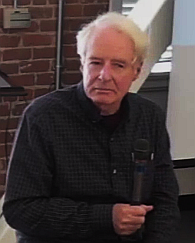Adam Hochschild
Appearance

Adam Hochschild (born October 5, 1942) is an American author, journalist, and historian, whose best-known works include King Leopold's Ghost (1998), Bury the Chains (2005), The Unquiet Ghost (1994), and Spain in Our Hearts (2016).
Quotes
[edit]- [T]o fight a complex, mechanized war, a disciplined army responsible to a central command is far more effective than a range of militias reporting to a crazy quilt of political parties and trade unions.
King Leopold's Ghost (1998)
[edit]- I realized something else about the terror in the Congo and the controversy that came to surround it. It was the first major international atrocity scandal in the age of the telegraph and the camera. In its mixture of bloodshed on an industrial scale, royalty, sex, the power of celebrity, and rival lobbying media campaigns in half a dozen countries, it seemed strikingly close to our own time. (Introduction, page 4)
- Furthermore, unlike many other great predators of history, from Genghis Khan to the Spanish conquistadors, King Leopold II never saw a drop of blood spilled in anger. He never set foot in the Congo. There is something very modern about that, too, as there is about the bomber pilot in the stratosphere, above the clouds, who never hears screams or sees shattered homes or torn flesh.(Introduction, page 4)
- From the colonial era, the major legacy Europe left to Africa was not democracy as it is practiced today in countries like England, France, and Belgium; it was authoritarian rule and plunder.
- It is always tempting to believe that a bad system is the fault of one bad man.
- In the American South, there are hundreds of Civil War battle monuments and preserved plantation manor houses for every exhibit that in any way marks the existence of slavery. And yet the world we live in—its divisions and conflicts, its widening gap between rich and poor, its seemingly inexplicable outbursts of violence—is shaped far less by what we celebrate and mythologize than by the painful events we try to forget. Leopold's Congo is but one of those silences of history.
- The movement's other great achievement is this. Among its supporters, it kept alive a tradition, a way of seeing the world, a human capacity for outrage at pain inflicted on another human being, no matter whether that pain is inflicted on someone of another color, in another country, at another end of the earth.
- In the Soviet Union, for example, shooting or jailing political opponents at first helped the Communist Party and then Josef Stalin gain absolute power. But after there were no visible opponents left, seven million more people were executed, and many millions more died in the far-flung camps of the gulag.
"Why Putin Made Peace With the Soviets’ Archenemies" (The Atlantic, November, 2022)
[edit]- It is impossible to watch Vladimir Putin's arrogant invasion of Ukraine without being appalled by its savagery. Dead men and women strewn on the streets of Bucha, hands bound behind their backs. Russian soldiers raping women, sometimes in front of husbands or children. Russians seizing loot of every size, from cellphones to giant John Deere wheat-harvesting combines. And, again and again, testimony about torture: beatings, electric shocks, near suffocation with plastic bags.
- Before the U.S.S.R.'s collapse, in 1991, its rulers portrayed that war starkly: The Whites were evil reactionaries who tried to delay the glorious triumph of Soviet rule. But Putin, whose passion is for empire, not communism, has a different view. He would love to restore the power of both czarist Russia and the Soviet Union, which extended over territory far larger than his own shrunken Russia of today.
- Long before the civil war tore Russia apart, the challenges of holding such a huge country together, against threats without and centrifugal forces within, had been handled with widespread oppression as well as tight control from the top.
- A less democratic regime than czarist Russia would be hard to imagine. Starting in the 17th century, serfdom enslaved a high proportion of the country’s citizens—a system maintained by whips, chains, the threat of separating families and exiling rebels to Siberia, and the massacre of tens of thousands of serfs who staged hundreds of revolts over the years.
- As in all despotisms, power rested upon violence. In the eyes of the regime, Russian citizens were either loyal subjects who knelt to the ground when the czar passed or deadly enemies most likely bent on assassination. The idea of a space in between barely existed. Over the centuries, five czars were indeed stabbed, strangled, shot, or otherwise assassinated, as were several grand dukes and other high officials.
- Vladimir Nabokov's father, a democratically minded politician who had been arrested by a Communist Red Guard, managed to escape and flee the country, but not before the family’s cook made him caviar sandwiches for the journey.
- In a nation so deeply xenophobic to begin with, the ultimately victorious Communists never forgot the foreign troops who had tried to strangle their baby in its cradle.
- One more aspect of the Russian Civil War reverberates directly with the conflict we are now watching play out. The war was not just about who would rule Russia, but about whom Russia would rule.
- Outlying areas of the old Russian empire took advantage of the Red-White struggle to battle for independence. Poland, Finland, and the Baltic states did so successfully, Ukraine unsuccessfully. The fighting in the latter, among Reds, Whites, and several rival Ukrainian forces, convulsed cities in the headlines today: Kyiv, Odesa, Kharkiv, Kherson, Mariupol.
- Although mortal, existential enemies, both Reds and Whites were united on one point: They wanted the boundaries of the Russia they hoped to control to be as wide as possible. Both sides had little but hatred for these non-Russian independence movements, especially the one in Ukraine, a land so rich in grain, iron, and coal.

